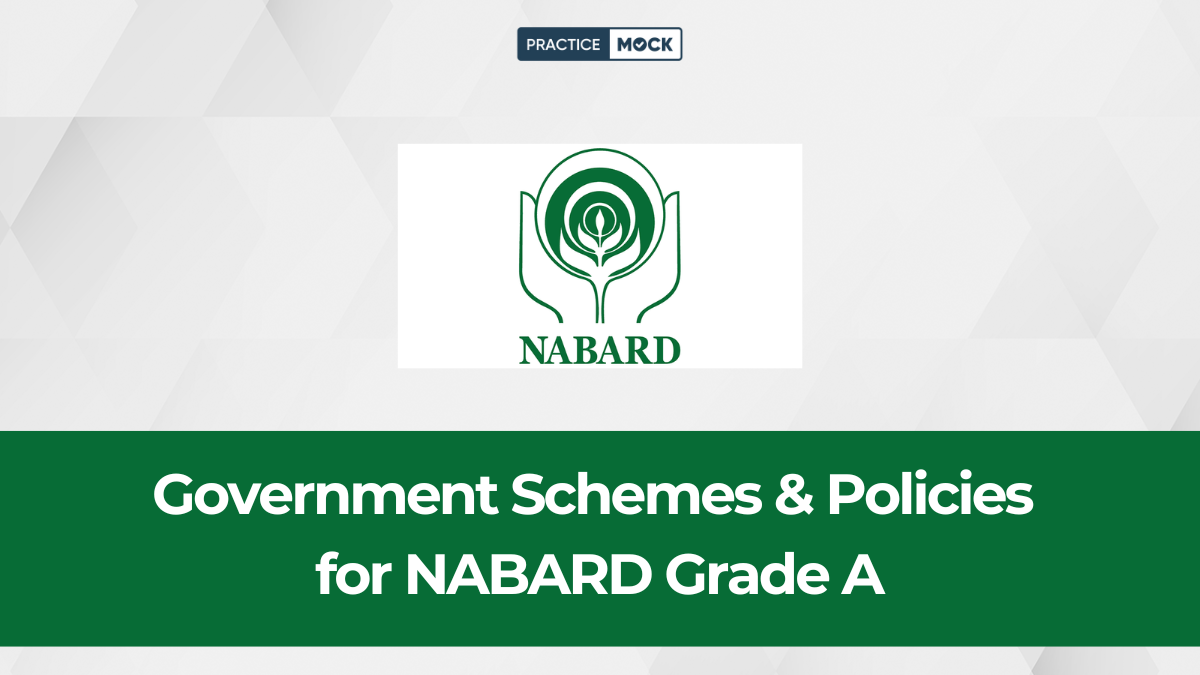When it comes to cracking NABARD Grade A, government schemes and policies are like those scoring topics you just can’t ignore. As a prospective employee of the National Bank for Agriculture and Rural Development (NABARD), it is essential to understand the government schemes that are designed to support the agricultural sector and rural development in India. Government schemes for NABARD Grade A are extremely essential for the preparation of the exam. In this article we have discussed the various government schemes & policies for NABARD Grade A. Let’s simplify this topic and understand how you can make this section your strength in both Phase 1 and Phase 2.
Government Schemes & Policies for NABARD Grade A
When it comes to the NABARD Grade A examination, any government schemes and policies related in general and related to agriculture, rural development, and economic & social issues are simply non-negotiable. You cannot imagine yourself giving the NABARD Phase 1 & 2 without having proper knowledge of government schemes & policies. In the NABARD Grade A exam, especially in ESI (Economic & Social Issues) and ARD (Agriculture & Rural Development), government schemes play a key role. Also, in descriptive answers or interviews, quoting relevant schemes shows awareness and adds value to your answers.
Most Important Schemes for NABARD Grade A
Let’s not get overwhelmed by hundreds of schemes. Here are the ones that are high-yield and must-prepare:
- PM-KISAN – Direct income support to farmers.
- PMFBY – Crop insurance and risk mitigation.
- E-NAM – A boost to agri-marketing.
- RKVY – For holistic agricultural growth.
- SHG & NRLM – Empowering women through rural livelihoods.
- Startup India & Stand-Up India – Rural entrepreneurship focus.
- PM Awas Yojana (Gramin) – Housing for rural poor.
- Jal Jeevan Mission – Water supply in rural areas.
- KUSUM Scheme – Solar pumps for farmers.
Make short notes of each scheme with bullet points and revise them weekly.
You might also be interested in NABARD Grade A Cut Off 2025
How to Remember Schemes Smartly
It is understandable that it sometimes becomes very difficult to remember so many schemes along with such a vast syllabus. But you don’t have to worry about it. There are several tricks that can help you remember schemes smartly, like It’s easier to revise when you know what comes under Agriculture, Rural Development, Finance, etc., so you can group the schemes by ministry. Then make a timeline and track when schemes were launched. Visual learners will love this. You can also use sticky keywords, for example, “Samman” in PM-KISAN, which will help you recall it’s about respect/income for farmers.
Link Between Policies and Exam Questions
It’s not just schemes—policies and frameworks like the National Education Policy (NEP), Agri Export Policy, and various Five-Year Plans are equally important. You don’t need to read them in detail, but understanding their objectives and how they align with NABARD’s goals can help in descriptive papers. A lot of students often wonder, “Why should I study government schemes and policies in such detail?” Well, the thing is that the NABARD Grade A is not just testing your memory; it’s checking how aware and connected you are with the real-world agricultural and rural economy.
Government schemes like PM-KISAN, eNAM, PMFBY, or Soil Health Card are directly linked to farmers’ welfare, credit access, insurance, market reforms, and overall rural upliftment. And the examiners know this too. That’s why they often frame questions around the objectives of the scheme, launch year and ministry, budgetary allocations or updates in the current year, benefits to farmers and rural sectors, or any recent news or changes in the scheme
So when you’re reading a policy, don’t just skim through. Try to understand the purpose, what problem it’s solving, and what kind of questions can be made from it. This habit can actually help you predict questions and answer them more confidently in the exam.
In short, a solid grasp of policies = more marks + better understanding of the agri-sector!
Join our unique Telegram group immediately to skyrocket your preparation for Regulatory exams via expert guidance, top tips, perfect feedback, and much more!
[ Click Here to join the PracticeMock Telegram Group! ]
| Related Blogs: | |
| NABARD Grade A Syllabus | NABARD Grade A Cut Off |
| NABARD Grade A Salary | NABARD Grade A Preparation Strategy |
| NABARD Grade A Documents Required | NABARD Grade A Handwritten Declaration |
FAQs
Because many questions are asked about recent schemes related to agriculture, rural development, and farmers’ welfare.
Focus on schemes like PM-KISAN, PMFBY, Soil Health Card, e-NAM, PMKSY, and SHG-related schemes.
Use sticky keywords from the scheme names and relate them to their objective.
Yes, these are frequently asked in MCQs and matching-type questions.
Mostly, central government schemes are asked, but if a state scheme is in national news, it can appear.
- Sign Up on Practicemock for Updated Current Affairs, Free Topic Tests and Free Mini Mocks
- Sign Up Here to Download Free Study Material
Free Mock Tests for the Upcoming Exams
- IBPS PO Free Mock Test
- RBI Grade B Free Mock Test
- IBPS SO Free Mock Test
- NABARD Grade A Free Mock Test
- SSC CGL Free Mock Test
- IBPS Clerk Free Mock Test
- IBPS RRB PO Free Mock Test
- IBPS RRB Clerk Free Mock Test
- RRB NTPC Free Mock Test
- SSC MTS Free Mock Test
- SSC Strenographer Free Mock Test
- GATE Mechanical Free Mock Test
- GATE Civil Free Mock Test
- RRB ALP Free Mock Test
- SSC CPO Free Mock Test
- AFCAT Free Mock Test
- SEBI Grade A Free Mock Test
- IFSCA Grade A Free Mock Test
- RRB JE Free Mock Test
- Free Banking Live Test
- Free SSC Live Test



